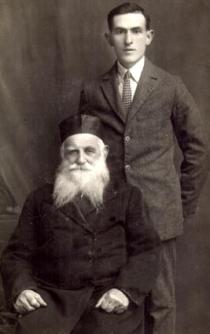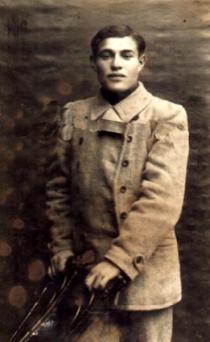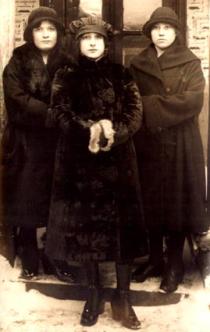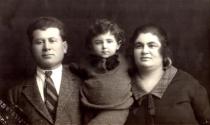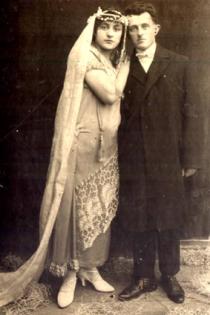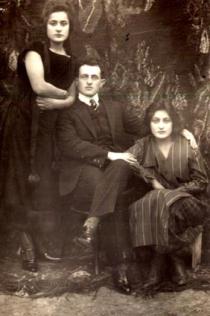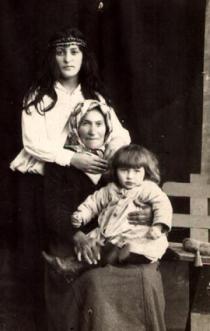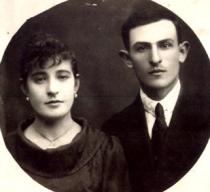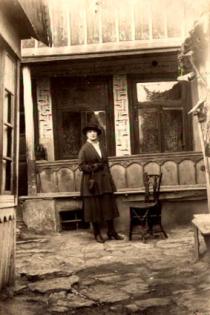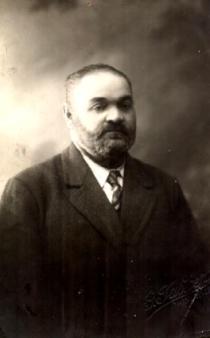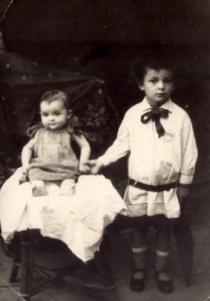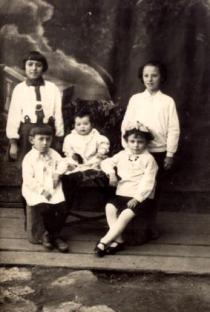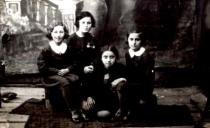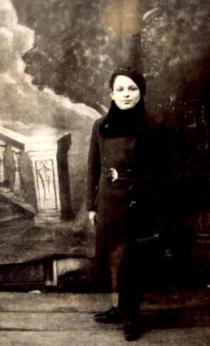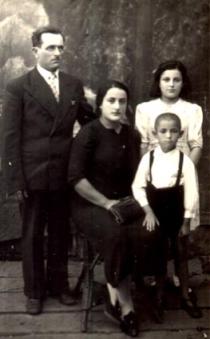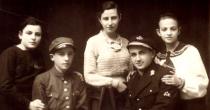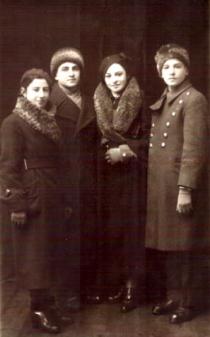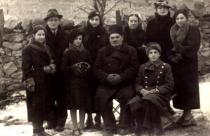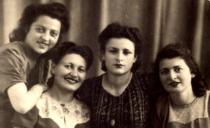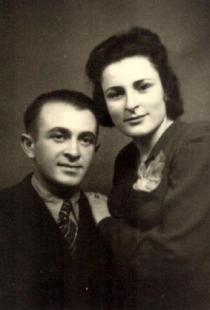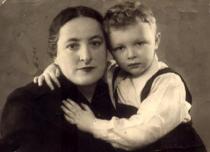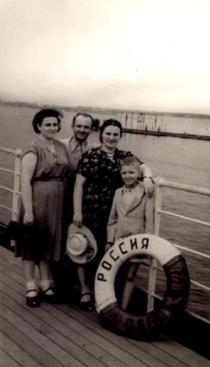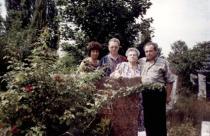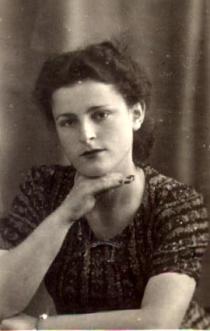
Raisa Roitman
Kishinev
Moldova
Interviewer: Zhanna Litinskaya
Date of interview: July 2004
Raisa Roitman lives near a large park, in an old, beautiful district of Kishinev [Chisinau in Moldovan] built in the 1960s. The yard of the so-called Khrushchovka 1 is very green. Raisa’s two-room apartment is well-furnished. She lives with her son now, and the apartment is too small for two adults. Raisa Roitman is a buxom woman. She is very polite and reserved. Raisa has taken out a lot of old photographs. There are a lot of pictures, and all of them are very interesting. Raisa comes across as quite standoffish. She is reserved and rather tacit. Her answers are curt. She is not willing to say much and she avoids answering certain questions that refer to her private life. Nevertheless, in the course of the interview, Raisa comes to trust me more and we part as friends. A couple of weeks later, I find out from one of the employees of Kishinev Hesed 2 that Raisa had immigrated to Israel shortly after our meeting. She didn’t tell me anything about her intentions.
Rubel was the surname of my paternal great-grandfather. The surname, which looked more like a nickname, was passed on to my grandfather, then to my father and then to me. Great-grandfather Itsik Rubel was born in the 1840s in the town of Rezina [80 km from Kishinev]. He lived there all his life. Itsik was involved in agriculture and mostly in viniculture. He had a large vineyard with vintage variety. Great-grandfather worked mostly by himself, occasionally hiring workers during the harvest time. He made wine and then sold it to the marketers from Kishinev at a wholesale price. Itsik had his own house, though it was rather small and modest, not to say poor.
My great-grandmother Charna was a housewife. She was a tall beautiful woman, always dressed in a dark skirt with an apron, blouse and a neckpiece. Grandmother also wore a crocheted headkerchief with lace trimming. Itsik was a good match for Charna – a tall and handsome tanned old man with a wrinkly face and a spade-like beard. He always wore a broadbrim hat or a kippah when he went to the synagogue. He also had tallit and tefillin. He never worked on Sabbath, even in the busiest times. My great-grandmother was a housewife, she raised the children and helped Itsik with work in the field. Her hands were parched because of the sun and with the dirt ingrown in the skin. Charna was also religious, observed Sabbath, the kashrut and raised her children as true Jews. I don’t remember Great-grandfather Itsik very well. He died in 1930, when I was a small girl. Great-grandmother died later, in 1939.
Itsik and Charna Rubel had many children. I know hardly anything about them. I know that the eldest one, Monysh, was also a vine grower and lived in Rezina, in Itsik’s house. He died in 1920. I don’t know what happened to his wife and children. Out of all the siblings of my paternal grandfather I knew grandfather’s sister Perl best of all. She lived in Rezina with her husband David [Roitman], who worked from morning till night, and her son Nahman. She was a housewife. With the outbreak of World War II 3, she and her husband went into evacuation on foot. They reached Rybnitsa, where Grandfather’s younger brother Gedali Rubel lived and worked. They didn’t walk far and were chased down by the Fascists. All of them – Perl with her husband and younger son and Gedali with his wife – were brought to a ghetto in Transnistria 4, in the town of Balta [Vinnitsa region, today Ukraine, about 250 km from Kiev]. All of them perished there during one of the actions against the Jews. Perl’s son Nahman, born in 1920, was drafted into the army in 1941. He was in the labor army 5 and when World War II was over, he came back to Kishinev.
My grandfather Abram, born in the 1870s in Rezina, was Itsik’s middle son. He got married rather early, which was traditional for Jews. His wife Nehama was also from Rezina. She was even younger than Grandfather Abram. My grandmother’s maiden name was Torba. They [her parents] had many children, but I only knew Uncle Yankel and Aunt Haika, who lived in Kishinev. Yankel had four children. All I know is that they left their parents’ home at a young age. They were members of an underground Communist organization. They were often imprisoned in Romania. Yankel died at the age of 94. Haika lived a long life as well.
Grandfather Abram finished cheder. I don’t know whether he got any further education. I think that his education was rudimentary. He could read and count, which was necessary in his work. Abram was a forwarding agent. He accepted cargo at the railway station and then forwarded it to the clients, who were rich victualers and owners of stores. This job wasn’t stable. Besides, it didn’t yield a sufficient income. It took a lot of money to support a large family.
Abram and Nehama had nine children. I only knew my father’s eldest brother Yankel. I remember the names of the rest – Nahman, Srul, Revekka, Golda, Lena… The thing is that in 1913 Grandfather Abram left for Argentina to look for a job and a better living for his children. Some of the elder children left with him, and Grandmother Nehama with the rest of the children joined them in a couple of years. That is why I never met my grandparents, my uncles and aunts. Only the eldest son Yankel, born in 1892, and my father Shapsha were so much against the departure to Argentina that Grandfather Abram got upset with them and left without his elder sons. Father and Yankel also were frustrated that they parted with the family and didn’t keep in touch with them for a long time. Only ten years later did they start to correspond with the family.
Father and Yankel had already been working when their family left. They were loaders at the creamery since the age of 13. Yankel lived in Rezina. He got married rather early. His wife was a Jew called Pesya. They had four children – a boy, Monya, born in 1922, and the daughters Golda, born in 1917, Revekka, born in 1924, and Leya, born in 1926. Yankel worked really hard to provide for such a large family. He worked two shifts at the creamery. On 12th October 1935 my uncle died as a result of the collapse of the ceiling in one of the creamery premises. During his funeral the coffin wasn’t open so that the relatives wouldn’t see Yankel’s dreadful remains.
For two years Pesya and her children lived on the money given to them by my father and the kin from Argentina. In 1937 they received an invitation from Argentina and Pesya left with her children. I loved them a lot, especially Revekka and my peer Leya. We took a picture together before they left. That was the last time I saw them. Before 1940 we received letters from Argentina and then the Soviet regime was established 6 in Bessarabia 7 and it was impossible to write to our relatives abroad 8. We couldn’t correspond with them after the war either.
I found out from my distant relatives, who lived in Israel, that neither my relatives who left with Grandfather, nor Yankel’s children ever became rich. However, they had a decent and good life. They didn’t respond to my letters that I sent after perestroika 9, when it became possible to keep in touch with relatives abroad. I know that Grandfather Abram and Grandmother Nehama died in the 1960s, and both of them were over 90 years old. Yankel’s children are still alive and have their own families with the exception of Leya. She was the only one who remained single. Unfortunately this is all I know about my father’s family.
My father Shapsha was born in 1894. He studied at cheder until he turned twelve. He began working at the age of 13. Father didn’t go to school. In spite of the fact that he was self-taught, he was a very literate man. He knew Russian, later he studied Romanian. Besides, he had an aptitude for Mathematics. He was able to add, deduct and multiply up to three figures. After Grandfather Abram’s departure for Argentine, he and Yankel lived with their Grandparents Itsik аnd Charna. Maybe for the reason that they were the bread-winners of the family neither my father nor Yankel were drafted into the Tsarist army during World War I.
Father worked as a loader at the creamery. He loaded milk and butter and delivered it to the sales agents. Owing to his intelligence and good sense he became the assistant to the owner. During one of his trips he met Moishe Lerner, the owner of the creamery located in the small town of Vad-Rashkov. He invited him to come over to his house. Shapsha was rapt by the beauty of Moishe’s daughter Tabl and began to make frequent trips to his colleague from Vad-Rashkov, [90 km from Kishinev]. In a couple of months Shapsha sent a shadkhan to Moishe and in 1924 my parents got married.
My mother’s parents, Moishe and Sura Lerner, born in Vad-Rashkov in the 1870s, had a modest living. Grandfather’s creamery was the only income source for the whole family. Although the yielded income wasn’t high, it was enough for the Lerners to get by. The creamery premises are still preserved in the town. Moishe had an adobe [construction material made from clay and thatch] house, consisting of three rooms. The members of this large family usually gathered in the largest room during family reunions on Sabbath, on Jewish and family holidays.
Grandmother Sura was a housewife. Her mother, my great-grandmother Haya was helping her out. She was born in a Moldovan village, and there were only two Jewish families there. She was equally fluent in Russian and Moldovan, but she preferred Yiddish. Great-grandmother lived to be almost a hundred years old, preserving a clear mind and a great sense of humour, being kind and benevolent. Haya had an ear for music and a melodic voice in spite of her age. She used to sing beautiful Jewish songs to her great-grandchildren and grandchildren. She was also good at knitting and embroidering. The ladies of our family looked very nice in her handmade laces. Haya had a calm death as if she just fell asleep. She passed away at night, on 8th May 1940.
Moishe and Sura lived the way other Jews from small towns did. They observed Jewish traditions, celebrated Sabbath, went to the synagogue, even raised their children in a Jewish spirit. Finally, at the end of the 1930s Grandfather was severely afflicted with leukemia. He died on 9th May 1941.
Moishe and Sura raised five children. Ousher, born in 1899, was the eldest. He lived not far from my grandparents, with his wife Klara and three daughters – Fira, Feiga and Mara. Ousher was a peasant. His wife and children did their best to help him with work, but their family still lived from hand to mouth. On 8th July 1941 Klara and the youngest girl, Mara, died during the bombing. Ousher, his daughters and Grandmother Sura were captured by the Germans on their way to evacuation and happened to be in Kishinev ghetto 10. Here Grandmother and Ousher died of hunger in the first hard winter. The girls survived. Feiga has terrible memories of the war times. All of her fingers were amputated as a result of severe frostbite. Fira and her daughters have lived in Israel since the late 1980s. Feiga was married to Magelman and lived in Soroca [130 km from Kishinev] with two sons.
The next son, Leib, born in 1901, owned a small bakery. Apart from the ordinary bread, Sabbath challah, Purim hamantashen and white loaves were baked there. Leib’s family was so indigent that Reizl had to learn how to sew. It helped the family budget. Leib and Reizl had three children – the daughters Ida and Sonya and their son, Pinhus. During World War II all of them were in evacuation in Andijon [today Uzbekistan, 3500 km from Kishinev]. Leib died from typhus fever on 23rd March 1943. Reizl and her children came back to Moldova and settled in Soroca. She worked very hard as a seamstress for her children to get a good education. She died in 1967. Her children left the town with their families. Ida is currently residing in Israel. She took back her maiden name of Lerner after her husband’s death. Pinhus and two of his daughters are in Chicago. Sonya Vougsdorf [married name] also lived there. She died in 1998.
Mother’s younger sister Feiga, born in 1907, was a very beautiful woman. She got elementary education. She was married to Shneer Kleiman, who worked as a steward in the store owned by his rich relatives from a small Jewish town, located not far from Vad-Rashkov. Unfortunately, I don’t remember the name of the town. Feiga and Shneer had two children – Rimma, born in 1928, and David, born in 1930. Feiga was a housewife. She took care of the household and raised their children. Feiga’s family was also evacuated to Andijon. When she returned to Moldova, she settled in Soroca, not far from Leib’s children. Feiga didn’t live a long life. She died in 1951 from liver disease. Her children got university education. Rimma was a therapist. She died a couple of years ago in Kishinev. David was an engineer. He lived in Moscow and died in 2000.
The youngest in the family, Joseph, born in 1910, is still alive. He is still of sound mind and body. He is currently residing in the USA. His wife Fira died three years ago. Their twin daughters Mara and Raisa have families – children and grandchildren. Sometimes they send me New Year’s greetings.
My mother, Tabl Lerner, born in 1904, wasn’t the most beautiful, but she was the most intelligent out of all the children of Moishe and Sura. She was able to express reasonable thoughts and make wise decisions. She was the head of our family. Father followed my mother unconditionally. She was often the ‘judge’ in many moot questions addressed by friends, relatives, neighbors. Usually those were issues concerning reconciliation of some quarreling spouses, raising children, keeping a family budget, seeing a doctor. Mother was an intellectual person, though she only had elementary education. She was very good at Russian as she studied it at school, and later on she was fond of Russian literature. She knew the works written by Pushkin 11, Lermontov 12. She was also attracted to Lev Tolstoy 13 and Fyodor Dostoevsky 14. My mother was self-taught. She had an insatiable appetite for learning. When Bessarabia became Romanian territory 15, Mother learned Romanian rather quickly.
Mother had many friends and admirers. But she liked Shapsha, who called on her father all of a sudden, at once. When my adolescent parents met, they soon began dating. Father came to Vad-Rashkov, and Mother used to come to Rezina. On 11th November 1924 they got married. I have a picture of the gorgeous newly-weds. Mother was dressed in a posh dress and Father in a new suit. The wedding took place in the synagogue in Vad-Rashkov under a chuppah. There were a lot of bride’s and groom’s relatives. Mother said it was very merry. Klezmer music was played and the guests danced till dawn. The tables were abundant in delicious dishes, mostly cooked by my grandmother and great-grandmother Haya. The bride had a dowry. I don’t know what amount was given to my father, but it was enough to buy a small house in Vad-Rashkov, where Shapsha and Tabl settled.
I was born in that house on 21st April. I was given the Jewish name of Ruklya, but I was registered with a more modern Russian name 16 – Raisa. My parents called me Raisa, only Great-grandmother Haya called me by my Jewish name. In 1930 my brother Motle was born. I remember the day when my mother was giving a birth to my brother. Farther was going to and fro. The moans and screams were heard from the bedroom. Then I heard the cry of the baby. I remembered it for ever. I loved my brother at once. I had a kind of adult and maternal feelings for him.
I remember my childhood very vividly. I recollect our house – a small adobe low-set house, consisting of two small rooms and a kitchen. There was a stove in the kitchen, which was heated with firewood. It was used to cook food. Later on we had a Primus [Primus stove: a small portable stove with a container for about 1 liter of kerosene that was pumped into burners], and Mother used the stove only for heating purposes and during preparation for Sabbath, when a lot of dishes were supposed to be cooked and kept warm for the next day. Mother usually started cooking festive Sabbath dishes since early morning on Friday. Friday and Saturday were special for our family, because Father worked in Rezina and came home only on his days-off. Early Saturday morning my parents left for the synagogue. When they came back, the dinner cooked on Friday was still warm. On Sabbath we often went to Grandfather Moishe. All the children and grandchildren got together in the drawing-room. The table was laid with such festive dishes as gefilte fish, chicken broth and tsimes. Challah and wine were in the center of the table, and Grandfather was saying a benediction. After that, I, the favorite granddaughter, came up to everybody with a wine carafe on the tray and everybody was supposed to sip wine from that vessel.
We also observed the kashrut. There was a shed in the backyard of our house. Firewood and other household things were kept there. Father made a coop here for chicken and ducks. We didn’t have a kitchen garden, because the whole yard was the size of a room, but poultry was a big help for us in nutrition. Mother took chickens to a shochet. I often went with her. When I grew up, I went to the shochet by myself. I observed the butcher putting the fowl on hooks so that the blood would seep into a special tray. Only after that the chicken was considered kosher. After that, Mother plucked feathers from the chicken. She disemboweled the chicken and scorched chicken at home. The meat was also made kosher. There was a special cutting board with the notches placed at a certain distance from each other. Salted meat was placed there and blood would seep from the notches. Meat was made kosher within an hour. There were separate dishes for meat and dairy, as well as differently marked knives and cutting boards.
Since my early childhood I went to the synagogue with my parents. There were several synagogues in our small town. I remember four of them. Maybe there were more than that. The synagogues weren’t classified in terms of the craft. Synagogues were attended by the Jews who lived in the closest vicinity. There was a rather large synagogue not far from our house. It was a one-storied building, though men and women prayed in different halls. On Saturdays Father put on his tallit and tefillin. I carried his prayer book to the synagogue. Sabbath was sacred to my father, though during the rest of the week he was a secular Jew. He didn’t even cover his head all the time. What I liked the most in our synagogue was the place where the Torah was kept – adorned with gold and velvet. I liked to listen to the singing of the cantor and chorus. It was spectacular.
Synagogues were crowded in our town. The population of the town mostly consisted of Jews. There were a few rich people. I remember the owner of the manufactory store, Tsenner, and the owners of the grocery stores, the Goldenbergs and Fainsteins. The shoe-store belonged to Gonikman. There were also several doctors and a lawyer. The rest of the population lived very moderately, not to say indigently, counting every kopeck. My family was one of those. There were neither class nor national divisions among children. All of us were very friendly – Moldovans, Jews, the children of the rich, middle-class and poor people. Jews respected the poor ones. On Sabbath and holidays there were always indigent Jews, who where sitting at our festive table.
I had a lot of friends, mostly among boys. In winter the Dniestr was frozen and we used it as a skating rink. I didn’t have my own skates. I usually borrowed them from some boys, who helped me skate on ice. In summer, I liked to stroll in the central park, located on the bank of the Dniestr, on the picturesque turn under the hill. There was a large and nicely decorated Orthodox church on the central square. The bell toll of the church was very beautiful and we liked to listen to it. I also liked going to the market, located not far from the church. The counters were full of all kinds of vegetables and fruits of different colors. There was also a wholesale of grapes. Father always bought grapes from one and the same Moldovan. He also made wine for us, which was kept in our cellar. Mother liked to haggle. How could she do without making a bargain? The sellers from the market went shopping to the stores to buy the things they needed as well as presents for their children. The peasants liked bagels most of all. They bundled bagels on the thread and put it over the neck. Jews and Moldovans treated each other as neighbors. I can’t say it was a cemented friendship, but at least there were no insults.
Jewish traditions were observed in the house of Grandfather Moishe. I learnt from my neighbors about the Jews, their mode of life, traditions and holidays. The rabbi and his wife lived in front of our house. They didn’t have children and they loved me very much. I was a welcome guest almost every day. I am sorry that I fail to remember the names of such close people to me, who taught me the Jewish traditions. The rabbi’s wife taught me the ethics of the Jewish family life, housekeeping. She was always wearing nice dresses, wigs and kerchiefs tied in an eccentric way. She taught me to be dressed up in the house, for the family, so that the husband enjoys looking at his wife, not only the outsiders. She also taught me how to cook a variety of Jewish dishes in accordance with the holiday traditions. She and I baked hamantashen for Purim, potato fritters and doughnuts for Chanukkah. She also taught me how to place all Paschal products mentioned in the Haggadah on the dish and cook bitter herbs.
I liked holidays very much. The fall holidays of Sukkot and Simchat Torah appealed to me the most. They were after Yom Kippur, when our parents were fasting and attending the synagogue, and we, the children, were forbidden to have fun and chatter. I began fasting rather young, at the age of six. During other periods of time I couldn’t fast, but on Yom Kippur, I was as if choked and got over the fasting rather easily. I also enjoyed the ceremonious Rosh Hashanah, when they blew the shofar in the synagogues.
I liked Sukkot for its being so peculiar. There was a festive table laid in the sukkah, built by Grandfather Moishe. The sukkah was decorated with tree branches. I liked the mirthful holiday of Simchat Torah, when the Jews were carrying the Torah scroll with dancing and music. The parade, carrying a hollowed-out-pumpkin lantern with the candles inserted inside, was descending from the mountain to the central park and walking along the town. Like many other children, I remember Chanukkah, as I was given money by Grandfather Moishe. My mother’s brothers also gave me money.
We were looking forward to the joyful Purim. First, there was a pageant procession in the town. When I was in my teens, I also took part in it. Children got together in the rabbi’s house, where a Purimshpiel was organized. As a rule I was Esther, the heroine of the Jewish peoples. Apart from hamantashen there was also a white loaf, baked only in the rich houses. It was made of dough with honey and nuts. Not everybody could afford such a luxury. In the evening the Jews could be seen with trays, taking shelakhmones to each other. There should be no less than two presents. As we had a lot of relatives, my mother would start baking the hamantashen in the evening. She also used to make homemade sweets and cookies. My brother and I used to take those presents. We also were given delicious shelakhmones. We knew the way each lady baked, and we could tell with the eyes closed whose present it was.
Pesach was the king of all the holidays. We started getting ready for it right after Purim. I liked the fuss in the house. We were cleaning things, moving the furniture, beating carpets, whitewashing the stove, putting dressy curtains on the windows, and a lacy cover on the table. Even the chicken coops were cleaned. Father came home beforehand and brought presents for all of us – Mother usually got a nice shawl or fabric for a dress. I got patent-leather shoes or a dress, my brother was given boots or a coat. Though our garments were pretty nice, we were looking forward to getting new pieces. The chest with beautiful dishes was taken from the loft. Those dishes were used once a year for a week.
Chametz was banished from the house on the eve of the holiday. Father was walking around the house with a goose feather and sweeping out non-existent crumbs. Starting on that day only matzah was used. Sweet or sour keyzels, kneydlakh for the chicken broth were also made from matzah. Even gefilte fish was made with soaked matzah flour. Mother always baked nut cake for the dessert with the following ingredients: 100 nuts, whipped egg whites from ten eggs, matzah flour and lemon.
Father would always carry out the seder. First, I asked the four traditional questions about the origin of the holiday. Then my brother Motle took over. Our neighbors, the Tkaches, were always invited to sit at our festive table. They used to be rich, and then they went bust and became very poor. They had a large family of eight children. For the second seder we usually went to Grandfather Moishe. Grandmother Sura, who loved me best of all, always demonstrated special attention to me. She gave me the best presents and let me lay dishes on the table. So I felt that I was her favorite granddaughter.
In 1934, I went to a Romanian elementary co-ed school. I was good at my studies, ranking top of the class and getting the first and the second prizes. At the end of the year we were given prizes, usually these were books and backpacks. The teachers treated me very well. They had an equal attitude towards Jews, Moldovans and Russians. Jewish children were exempt from the course of Orthodox Christian religion. They were taught Jewish history. It was so interesting that Orthodox children cut their classes to attend our lectures. I liked such subjects of natural sciences as botany and zoology. I was also good at such crafts as knitting and embroidery. At the end of the year there was an exhibition organized at our school. The students’ works were exhibited there and my works were always in the most conspicuous place.
Grandfather Moishe asked me to embroider him a night shirt. Back in those times men went to bed in long night shirts. I had been procrastinating all the time, and didn’t manage to embroider the shirt for my grandfather. On 9th May 1941 Grandfather Moishe passed away. Great-grandmother Haya had died one year before. My grandparents were buried in accordance with the Jewish rites. They were covered in a shroud. I didn’t go to the cemetery. It was not traditional for the Jews to take those children to the cemetery, whose parents were still alive. I remember the period of mourning. We took part in it as well. We sat on the floor with our relatives. I was walking without shoes, just in my stockings. Our neighbor, the rabbi, read a prayer for the deceased.
I studied in Vad-Rashkov for four years. I had to go to another town to continue my studies, as there were no other schools in our town. I studied in Vornicheny for two years. The town was 18 kilometers away from us. I shared the apartment with two girls from our school. Our landlady was a Jew, Sima. We had bed and breakfast. She fed us very well. All of us lived in one room and got along with each other. On the eve of Sabbath, viz. on Friday we went home. We also went home for Jewish holidays. By then I wasn’t as delighted by the holidays as I had been in the period of my childhood. I was just paying a tribute to tradition. Besides, I didn’t have other things to do other than observing Jewish traditions.
The Fascist organizations of the Cuzists 17 and Legionnaires 18 were established. Jewish youth adhered to two opposite camps – Zionists 19 and Communists. I was indifferent to either of them. When I came for a visit to Uncle Yankel and Aunt Haika I heard their delightful stories about the USSR from their Communist children and their dreams about justice and equality in the society of the future. I, being calm and well-bred, and respecting traditions and the existing mode of life, wasn’t carried away by their ideas. I didn’t participate in the Jewish Zionist organizations either.
When in the late June of 1940, Soviet peace troops came to Bessarabia, my family wasn’t meeting them with admiration, the way many other Jews were. Moreover, we were plagued by the feeling of uncertainty. Father even locked the door. Nothing bad happened. We weren’t affected by repressions and sequestration, which started a couple of days later. We heard about those things from other people. There were few rich people in our town, and all of our acquaintances and relatives were poor. Father was employed at some sort of an enterprise. In late August I left for Rezina and entered the eighth grade of the Soviet school. I turned over a new leaf. My life was more interesting now. I was an excellent student at school as always, in spite of the fact that subjects were taught in Russian and it was rather difficult for me. I became fluent in Russian rather swiftly. The main difference between the Soviet and Romanian school was that now children of the poorest strata of society were able to study at school, before that it had been unaffordable for them. The atmosphere was also more democratic. I lived with my father’s aunt Perl. I made friends with her eldest son Nahman. We spent a lot of time together. It was a puppy love with him. I had a lot of friends. We became pioneers 20 and had a lot of new events for us – pioneer meetings, workshops, PT, but it didn’t last long.
In June 1941, I passed final exams for the eighth grade and was supposed to go back home on vacation, but I stayed in Rezina for a couple of days as I didn’t want to part with Nahman. At 12am on 22nd June we found out about the outbreak of the Great Patriotic War from Molotov’s speech 21. That was the last time I saw Nahman before leaving for evacuation. As it turned out, he was drafted into the Soviet army 22 in the first days of the war. There was panic at home. Father insisted on evacuation, Mother still had doubts whether to leave or not to leave. On 8th August the town was bombed for the first time. We stayed in the town for another week. Almost all the Jews left for the evacuation – some people left on carts, others went on foot. Some Jews, especially the elderly ones, weren’t in a haste to leave as they thought that the Germans would do no harm to them.
On 16th July my parents decided to leave, right after Kishinev was occupied. Mother thought that things would be settled down within a couple of days and we would be back home. She only took some documents and money. She even left her modest jewelry at home. Mother locked the house and gave the keys to the Moldovan neighbor, asking her to watch over the house. We didn’t take most of our belongings, we just had light luggage. Only Motle took his favourite thing – his backgammon. I still keep it. I don’t remember how we met our relatives on our way to evacuation. Soon the families of my mother’s relatives joined us. These were Leib, Feiga and Joseph. So, our big family left the household for nowhere.
We walked along the road together with other fugitives. There were frequent bombings and we had to hide in the field or in the forest. There was screaming and sobbing. There were wounded and killed people. Sometimes we went to the Ukrainian villages. The hosts were very hospitable. They let us take a bath in the bathhouse. We stayed overnight in their house. They also fed us, gave us milk and clean clothes. Kind Ukrainian ladies asked us to stay with them. They were sorry for my mother, me, and especially for my little brother. We carried on like that for a month. There was no way we could return home. In each village we came to, we got together by the radio at 12am to listen to the news round-ups. We found out how rapidly the Germans were penetrating and moving forward in our land.
On 25th August 1941 we happened to be in the town of Bataysk, Rostov oblast [today Russia], about 1000 kilometers away from our home. We took locomotive trains and moved further to the east. There were people evacuated from different towns and villages of Ukraine and Russia. There were crowds of people, but everybody was given a chance to get on the locomotive. There was hardly any food. We managed to get some boiled water at the stations, sometimes some food. We didn’t know exactly where we were going. All we knew was that we moved eastwards. It took us almost a month to get to the town of Andijon in Uzbekistan.
Father, together with other men, went to the evacuation point right away. They went to work as loaders in the vegetable warehouse. We found a lodging the same day. We rented a small house, where our family settled. We were starving at first. Though, owing to Father’s work at the warehouse he got potato and beet skins and semi-rotten cabbage leaves. We were fed once a day in the evacuation point. We were given some porridge made of water and grains. Usually the neighbor boy, who was lame, cried to us: ‘Porridge is given out’ and we would dash to the evacuation point with our plates. There were long lines of people. The most important thing was that we were given 400 grams of bread daily. It was military, underbaked, sour bread, but it seemed a tidbit to us. I went to the ninth grade in Andijon. I worked after classes during the second shift. I did my homework at night.
In 1942 Father, my uncles Joseph and Shneer were drafted into the labor front. They were sent to build the metro in Moscow. Father sent us letters. Sometimes he sent us money as well. It made our life a little easier. I worked as a loader at the cotton oil factory. Before I left the factory I was allowed to soak my clothes in cotton oil. I put as many clothes as possible and soaked them in oil very well. The members of my extended family were waiting for me by the entrance. There was a considerable lack of fats in our diet, so they had to suck cotton oil from my clothes. I was standing there and crying. Almost all the factory workers were taking the cotton oil the way I did, and there were other people close to us, who were saturating in oil like my relatives. Mother used to cry a lot because I worked very hard. I tried to leave some oil for my little brother. Motle took the hunger really hard.
At the beginning of 1943 my little brother and Uncle Leib got afflicted with typhus fever. I was surprised that the rest of our relatives, stuck together in our poky place, didn’t catch that disease. I was immune, as I had had this disease in 1936. No matter what we did we couldn’t save my brother Motle and Uncle Leib. They died on 23rd March 1943. They were put in the cart and taken to the cemetery. They were buried in a common grave for the afflicted with the typhus fever. I kept the backgammon of my brother Motle as a precious thing.
In spite of working hard, I finished school with honors in 1943. Father sent me some money. He insisted on my continuing my studies. I went to the town of Osh, located at the border of Uzbekistan and Kyrgyzstan. Rostov University was evacuated there. I submitted my documents and was enrolled without taking any exams, because I was an excellent student. I entered the Chemical Agents Department. I settled in the hostel. A new stage in my life began. I became a student. I had studied at Rostov University only for two months. In late October there was a terrible explosion in the laboratory of our university and a couple of our students died, many students were evacuated with severe scalds. I didn’t tell my mother about it, but Mother had a hunch that something had happened. Mother came to Osh, and having found out that I had remained alive by a miracle, insisted on my leaving the institute. I always listened to my mother and left Osh, in spite of liking my studies and having friends there.
I was transferred to the Tashkent Medical Institute, where I studied until 1944. I have never regretted that, because I understood that medicine was my calling. There, in Tashkent [today capital of Uzbekistan] I made friends with Jewish girls from Moldova 23, with whom I lived in the hostel. Gradually our life was getting better. I received an increased stipend and was paid for knitting, so I had the opportunity to send some money to my mother. What made me rejoice the most was that Nahman had found me via the bureau of the evacuees. We started to write each other tender letters. In late 1944 Father came back from Moscow and began working as a digger. He was grieving over his son’s death, but he tried not to show that to my mother. Mother couldn’t forgive herself for Motle’s death. She thought it was her fault.
In late December 1944, right after the liberation of Bessarabia we left for home. Of course, our way back home seemed much shorter to us. We had to change trains and on 3rd January 1945 we arrived in Kishinev. The city was dark, devastated and dilapidated. Father decided that we should stay in Kishinev, as Vad-Rashkov was also devastated. From our pal’s letters we found out that our house was demolished as well. So we didn’t go back to our town. There were a lot of unoccupied basement and semi-basement premises. We took one large room and began settling in.
Father started work at the creamery. Mother was a housewife. Shortly after my arrival in Kishinev, I applied to the newly-founded Medical Institute and was accepted in the second year. I was happy. Here in Kishinev I met Nahman. He barely participated in any battles. Like other Bessarabians, Nahman was demobilized from the lines in a month, as the Soviet regime didn’t trust people from the newly-annexed lands. In Buguruslan [today Russia] he entered the History Department at the Teachers’ Training Institute. In 1944, Nahman was among the first graduates. By that time he had become an active Komsomol 24 member, the secretary of the Komsomol committee of the institute. [Editor’s note: Komsomol units existed at all educational and industrial enterprises. They were headed by Komsomol committees involved in organizational activities].
Nahman came to Kishinev with other graduates of the institute right after the liberation of the city. Nahman moved in with us, being our relative. His close relatives died. His mother Perl and brother Gedali perished in a ghetto. Nahman and I became more and more close. Soon he proposed to me. It happened on Victory Day, 9th May 1945. Nahman and I were in Odessa on that day 25, strolling along a beautiful maritime boulevard. It seemed to us, that the entire population of Odessa was in the street. Unacquainted people were kissing each other, rejoicing in our victory and hoping for a bright future.
In spring 1946 Nahman and I got married. We had a hard life. Bread was given out by cards 26: there was neither provision nor essential commodities. But we were young, we loved each other and hoped for the future. I sold my bread card and bought my dream – nylon stockings. I also put on a skirt made from burlap and a patched blouse. That was the way I was dressed to go to the state registration office to register our marriage. In the evening our relatives got together in our dark room. We had tea with rye bread and sweets made of colored sugar and water. Then we danced to the gramophone and had fun.
We kept on living with my parents in their poky room. We made a kitchen from the small corridor, where Mother cooked on a Primus stove. We didn’t feel the lack of space. Our relatives came over often. We kept late hours, having tea and they stayed overnight. Some of them were sleeping on the table, others on the floor. There wasn’t enough room for everybody, but we had a good time anyway. I brought up my first-born son, David, in this room. He was born in 1948, and in 1952 I gave birth to another boy, Boris.
I didn’t quit my studies when David was born. It was difficult to combine my studies at the Medical Institute with sleepless nights, laundry and changing swaddles. My parents helped me a lot. I became a Komsomol member at the institute and even found time for social work. Nahman became a member of the Communist Party after graduation. He began to teach at the Teachers’ Training Institute, then at Kishinev University. When I was graduating from the institute, state anti-Semitism became commonplace. It was the year of 1949, famous for the overthrow of the anti-Fascist Committee 27, and then the Doctors’ Plot 28. I graduated that year.
In spite of having graduated with honors, I wasn’t accepted for the post-graduate studies, after I submitted the documents and passed all exams with excellent marks. They told me that I was to practice medicine first. But my Moldovan friend was easily accepted. I got my mandatory job assignment 29 to a distant Moldovan village, but they had to let me stay here, as my husband was working in Kishinev, and besides I had a small child. I was sent to the department of preventive care of the health care ministry and was employed as a therapist part-time. It was dreadful to practice medicine during the sensational Doctors’ Plot. I came across such a case: the patient whom I was calling on, shut the door right in front of me. She didn’t tell me anything, I understood everything by her grouchy look. It was hard for me to go to see other patients on that day.
When I addressed this case to the head of our department, he told me that patients were entitled to refuse to be treated by certain doctors and concocted a kind of a petty accusation for me. Jews were always criticized. In spite of being calm and reserved, I cried all night long. My husband was comforting me and saying that all that injustice would be over soon. He had the power to predict and at the same time to have a fair opinion on the reality. Either this was a feature of his character or his profession of a historian made such an imprint on him. Anyway when Stalin passed away in 1953, he wasn’t mourning like the rest of the people, he was one of the few ones who were almost glad. He said that now justice would prevail. I, being influenced by my husband, had a clear mind and took the death of the leader rather calmly. But my parents, especially my mother were grieving over it and crying.
Mother was ill at that time. Her health was undermined when she was working hard in Andijon. The years of starvation also affected her. Mother had liver cancer. In 1956 she died, being a little over fifty. She was buried in the Jewish sector of the Kishinev cemetery. Father read a commemoration prayer. It was very hard for me to get over my mother’s death. She was the dearest person to me. Father did many chores, trying to help me about the house. He went shopping, to the market, cooked and looked after the children. He was so complaisant and reliable that it helped me to overcome a hard period of grievance.
I have always had two jobs since our financial situation wasn’t favorable. I had to raise two children. The salaries of doctors and teachers weren’t high. I never got a promotion and remained in the same position. However, in 1956, after the revelations about Stalin’s personality cult, I had a new feeling of the wind of change. But in reality things didn’t change that much for the Jews. My husband was a talented historian. For several years he had been working on his dissertation 30, but he couldn’t defend it as it was declared outdated. Then he wrote another thesis, on a different topic, and he was told the same. He remained an ordinary teacher till the rest of his life.
Our children were growing up like any other Soviet children: nursery, kindergarten. When they were ill, my mother often looked after them, and when my mother died, Father would help out. In 1959 we got an apartment, and finally moved out of that basement. I am currently living in that apartment.
My sons were excellent students, both of them finished school with a golden medal. [Editor’s note: the golden medal was the highest distinction in USSR secondary schools. A student was supposed to have straight excellent marks (100%) to get the golden medal.] We paid a lot of attention to our children and tried to bring them up as civilized people. We used to discuss the books, read by our boys. They read almost all the Russian and foreign classics. They also knew Sholem Aleichem 31. At that time he was the only Jewish writer, whose works were published in Russian.
We were theater-goers. We also liked to attend symphony concerts, go on excursions to Moscow, Kiev. One of our vacations was totally devoted to Leningrad, its palaces and museums. We went to the seaside, to the Crimea, the Caucasus. I can say we had a full life. Of course, we were not rich: we didn’t own a house or a car, but at least we had a well-furnished apartment. We also could afford good food, clothes and recreation.
Jewish traditions were always kept only by my father. Of course, my husband and I were atheists. Nahman was a member of the Party. We worked on Saturdays, as Saturday was a working day, but Father always observed Sabbath. He attended the synagogue while he could walk. The kashrut couldn’t be observed, as it was hard to get any food products not to mention kosher ones. There was always matzah for Pesach. Father waited in a long line to get it in the synagogue. Father cooked traditional dishes for the holiday.
David and Boris always felt themselves to be Jewish and were interested in the long Jewish history since their childhood. Father told them many stories. He told them about the town we lived in, about Jewish traditions. I think he plied them with love for the Jewish people. Father lived a long life and died in his sleep in 1988, at the age of 94. He was buried next to my mother in the Jewish sector of the city cemetery in accordance with the rite. He was buried in a shroud. The warden of the synagogue, an elderly Jew, read a prayer.
My children got a wonderful education. The elder one, David, entered the Physics department of [Kishinev] university. He was an excellent student and graduated with honors. He worked for many years as a theoretical physicist. After perestroika the institute he worked for was closed down and David remained jobless. He decided to become an entrepreneur and founded his own company on sales and installation of computer equipment. His company is prosperous now. David was married, but got divorced. He keeps in touch with his son and helps him. My grandson Pavel, born in 1983, graduated from the police academy. He is currently living and working in Kishinev. He has a two-year-old son, my great-grandson Dmitriy. My son David left the apartment to his wife and lives with me now.
My younger son Boris followed in his father’s footsteps: he graduated from the History Department of Kishinev University. He is married to a Moldovan lady, Lidia. They have a wonderful family. They have two children – Polina, named after my mother-in-law Perl, born in 1985, and their son Sergey, born in 1987. Their children are grown now. Sergey is finishing school. Polina left for Israel to study. I visited her in Israel. We had a good time together. Israel is a marvelous country. I admire it, but I am always nostalgic about my motherland. Polina doesn’t want to leave Israel. She has become a real Israeli citizen. She observes all the traditions there. She has a lot of friends. Polina wants to serve in the Israeli army. She sees her life only there and I am happy she has found what she sought.
We always implicitly supported Israel, even during those years when it was officially stigmatized as an aggressive country. It was hard for my husband, as he worked in an ideological atmosphere, and he had to take part in the conversations and listen to accusations towards the young Israeli state. When the immigration started, most our relatives left for Israel. Neither my husband nor I wanted to leave, as we were attached to out motherland, Bessarabia. We were born and raised here, being part and parcel of it.
My husband died in 1989 from a heart attack. I have been by myself for many years now and I still can’t get over his death. He was a remarkable man – intelligent, thoughtful and kind-hearted. I was barely affected by perestroika and the foundation of the independent state of Moldova. Of course, I wouldn’t be able to live on my pension, but my children are helping me out as they have their both feet firmly on the ground. Besides, Hesed is assisting me a lot as well as other Jews. I receive food and what is most important, I have some moral support. I have a lot of friends among Hesed’s clients. We celebrate Jewish holidays and Sabbath together. I am not religious, but I became a member of the women’s club, where Jewish traditions are studied. I can say that perestroika brought about a revival of Jewish traditions, which is wonderful.
